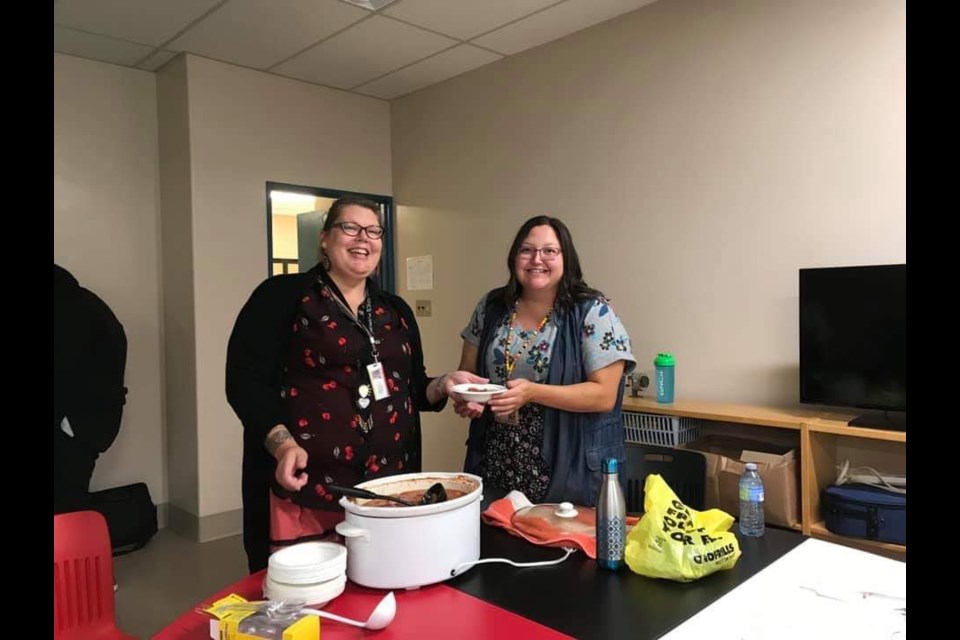COVID-19 has brought many changes to our tight-knit community, especially for the Indigenous people of Thunder Bay.
The Bimaadiziwin Wiidookaagewin Cultural Services through Dilico Anishinabek Family Care is taking this as a positive to its programming.
Beatrice Twance-Hynes, an original employee since 1988, has been with Dilico since the beginning and applauds the modern-day work Dilico has taken on to adapt to these changes.
“Back in early April when I had to go online, I was just so nervous.”
She’s more comfortable with it now. Noting the teachings, songs and sharing that has stemmed from them. What’s been most notable are the comments of gratitude from the elders.
“I saw one this weekend [and she said], ‘I really enjoy them. Don’t stop.’”
Adapting tradition to technology
The cultural programming began because there was a definite need in the community for cultural teachings, says Janine Desmoulin, another cultural services manager.
Janine started in the youth homes as a Cultural Wellness Mentor and says the online work has been very well received within the community.
“We know that our culture and traditions keep us together.”
The idea of community was questioned when quarantine began, and the loneliness everyone endured put a shadow over communal wellbeing.
This is where Dilico took it upon themselves to counter the solitude.
Bimaadiziwin Wiidookaagewin offers programming weekly that ranges from body mindfulness and Monday morning smudge and prayer, to hand drumming and children’s story time and song.
These programs can be accessed via their Facebook page by searching Bimaadiziwin Wiidookaagewin or through Dilico Anishinabek Family Care page.
Historically unique in modern times
“This is a completely Indigenously lead organization,” John Dixon, director of mental health and addiction services, says proudly. “[And we] put culture at the forefront.”
Dilico has been unique to Canada since their beginning in the 1980s with their integrated model of care. Most recently the agency has engaged in a lot of research and shares this with the communities.
And as for their child-welfare program, they are leading the way.
“I’m proud to see the agency as a whole take cultural practice into all the programs. We balance that ability to provide high quality, accredited care along with this wonderful, cultural program alongside the uptake and acceptance of equal value to the western approach,” Dixon says.
From in-person to online
Since 2012, when Twance-Hynes came on as the cultural manager, her priority was to recruit more cultural resources and elders; individuals that would engrain the Indigenous culture into the western world and this included traditional healing.
Since their first traditional healing program launched in 2013, it’s been a success.
Partnered with this are the annual powwows and the parenting program that adapts the teachings of the seven grandfathers and how to incorporate that into modern day child rearing. All of this has been well received.
“The community is really appreciative of our teachings, songs and sharing,” Twance-Hynes beams.
This obviously came with changes in how these teachings would be brought to the community during a global pandemic and has now been adapted into this online platform that is accessible for everyone.
New normal
Through adaptation to modern-day communicating and using this as an advantage to traditional teachings, Bimaadiziwin Wiidokaagewin Cultural Services of Dilico is succeeding.
While the community adjusts to this time, the online work Dilico is doing has been nothing but well received.
“I’m really proud to share my honesty, strength and wisdom from a live perspective,” says Desmoulin.
Through humility and adaptation, Dilico is being a model of what it means to take tradition and bring it to the forefront of modern day technology to benefit the Indigenous community and Thunder Bay.



